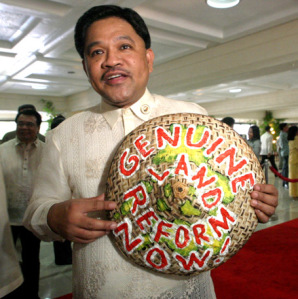Farmers blame DAR, CARP for allowing ‘Hacienda Binay’ conversion
Farmers group Kilusang Magbubukid ng Pilipinas (KMP) accused the Department of Agrarian Reform (DAR) and the Comprehensive Agrarian Reform Program (CARP) for allowing the conversion to an agribusiness park of a 350-hectare agricultural land in Rosario, Batangas reportedly owned by Vice-President Jejomar Binay and his alleged dummy businessman Antonio Tiu. The group said that it […]


Farmers group Kilusang Magbubukid ng Pilipinas (KMP) accused the Department of Agrarian Reform (DAR) and the Comprehensive Agrarian Reform Program (CARP) for allowing the conversion to an agribusiness park of a 350-hectare agricultural land in Rosario, Batangas reportedly owned by Vice-President Jejomar Binay and his alleged dummy businessman Antonio Tiu.
The group said that it is ridiculous for DAR officials to claim that it has no record of any transaction regarding the 350-hectare agricultural land. “It’s conversion into an agribusiness park will not transpire without the consent and blessings of the DAR,” said KMP chair Rafael Mariano.
Mariano said that DAR is responsible for monitoring and giving clearance in every transaction involving any sale, transfer, conveyance, and change of nature of agricultural lands.
“This clearly demonstrates the bankruptcy and failure of the sham CARP and the DAR to defend peasants’ rights over the lands,” Mariano said.
The group said that under CARP, widespread conversion of agricultural lands transpired, like in President Aquino’s Hacienda Luisita in Tarlac, Hacienda Roxas and Hacienda Looc in Nasugbu also in Batangas, Araneta Estate in Bulacan, Hacienda Dolores in Pampanga, and in the case of the so-called Hacienda Binay. Under section 65 of the CARP the conversion of agricultural lands are allowed into other uses five years after the award to supposed farmer beneficiaries.
The group maintained that “the agribusiness park in Rosario, Batangas allegedly owned by the Binays is a classic example of CARP’s failure to break big landlords’ monopoly of lands.
KMP also accused Tiu of being a “local conduit of global landgrabbers”, pointing to a study on global landgrabbing by Grain, an international non-profit organization that works to support small farmers and social movements in their struggles for community-controlled and biodiversity-based food systems.
According to a Grain study, Tiu entered into international agribusiness ventures with China and Saudi Arabia.
“We challenge Aquino’s DAR and Congress to immediately stop Tiu’s landgrabbing deals with China and Saudi Arabia. Aquino’s failure to stop Tiu’s deal with China and Saudi Arabia is tantamount to approval of big ticket landgrabbing and massive displacement of farmers in the countryside,” Mariano said.
The group reiterated that landgrabbing by big agribusinesses transnational proliferated under the CARP. The group cited figures from the research think-tank Ibon Foundation that said that some 1.2 million hectares are under agribusiness contracts and that leasehold farmers have increased from 555,232 in 1988 to 1,216,430 in 2012.
“Lands under leasehold arrangements increased from 582,476 hectares in 1988 to 1,740,345 hectares in 2012. Millions of farmers are still under contract agreements with plantation owners and agribusiness corporations, many of which contracts are onerous to the interests of farmers and farm-workers,” Mariano said.
